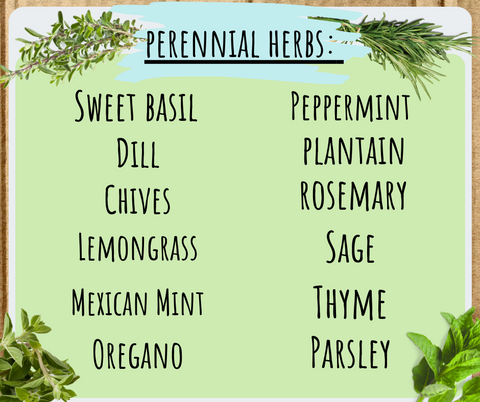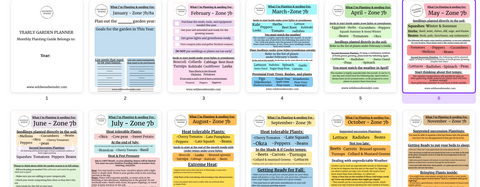Annual -vs- Perennial in the Garden
Now that your garden is primed and ready, it's time to start planting! But where do you start?
The seed aisle at your local garden center, lined with rows of seeds, can be confusing. Not to mention the live plant section outside with herbs you never even knew existed!
So, how do you navigate all this plant awesomeness? Let's first break it down into Perennials and Annuals!

Perennials vs. Annuals:
Once you figure out the difference between perennials and annuals, you can plan for the short- and long-term harvest!

What are Annuals?
Annuals are plants that only produce flowers/fruit/veggies for one cycle and then reseed again. The word Annual means yearly, so think about planting/seeding them every year.
When most people think of a garden, they visualize annual plants in that garden: squash, tomatoes, cucumbers, and corn. Those are your typical summer veggies.

If you want most of your fresh veggies in the spring, summer, and fall, you must plant/seed annuals.
I plant seasonally. So, I have a calendar and planting guide to keep me on track with when I need to grow the appropriate Annual in each planting season. You can grab your FREE downloadable/ printable planting guide and calendar at the end of this blog post! Here is an example:

If this is your first time gardening, you should start with a summer garden. Summer gardens have more of the vegetables you will recognize.

Annual plants need good soil and a garden area that has been planned out correctly. If you are just now getting into this garden blog series, start at the beginning to have a solid foundation to stand on.
Start here: 4 Things to Know Before Starting a Garden

Perennials
When people ask me which plants they should plant first to start a homestead or to be self-sufficient, I think of perennials!
What is a perennial?
The Britannica definition of a perennial is any plant that persists for several years, usually with new herbaceous growth from a part that survives from season to season.
Perennials are plants that can exist for a long time. So, these plants can last for years without you having to replant or reseed them each year. Planting perennials also means more bang for your buck!
Perennials can be edible or nonedible. In this blog, I'll be covering edible perennials.
Edible Perennials:

Most vegetables are annual plants, but some perennials are veggies, too! Adding one to two perennial vegetables yearly will give you a continuous, reliable crop.
Edible perennials don't have to be just planted in a designated gardening area. Many edible perennials have beautiful foliage that can easily be incorporated into decorative landscaping. Most of them have unique foliage that will add texture, color, and shape to your landscape!

What if your landscaping was full of edible plants? There is nothing wrong with beautiful flowering landscaping trees, but what if you could walk into your yard and pick an apple, pear, or even a delicious plum? Instead of the same old cookie-cutter green hedges, what if we replace them with blueberry bushes? What if your landscaping could feed you while providing beauty?


Imagine where you could add some of these valuable plants to your existing landscape. All of this is possible! So, where would I start if I wanted to add perennials?
Here are some suggestions that have worked for us on our little homestead.

(Image)
Herbs can be Perennial:
If you are into cooking, you know there is nothing better than fresh herbs! Not only do they taste good, but they also have medicinal properties.

A lot of herbs are perennials, too! Most are hardy and love to live in pots, just as they do in the ground. Here are some of my favorites:

Perennials are an excellent long-term investment in any homestead or garden. If you're unsure if perennials are for you, try adding at least one perennial plant to your garden each year. Once you experience the magic of their reappearance each year, you'll want them around!
I have added a printable version of perennial plants for you to use as a guide. You can grab it at the end of the blog below!
Best of Both Worlds:
So which one should you choose? If you want a well-rounded garden, you will have to do both.
You can not enjoy homegrown tomatoes or summer squash if all you have is a perennial garden. And, if you have just an annual garden, forget about the blueberries and the asparagus! As you can see, you want a little of both worlds.

Things to think about:
-
You must be more strategic when planting perennial plants, bushes, and trees. How big will it get? What is its life span? How much sun does it need? What time of year does it fruit or produce? What growing zone does it need? You need to know these things before buying and planting a perennial.
Make a list of the veggies & fruits you love to eat. Now research them! You will find which ones will and will not work for you. - Here are some examples of how plants might not work: I live in zone 7B; planting a banana tree in my yard will grow but never produce bananas because temperatures do not get warm enough. But I can plant blueberries and have successful crops.
- How much room do you have? You want to grow pumpkins only if I have a big enough backyard because they create a sprawling vine that will take over my growing space. But I can summer squash that bunches and mounds, taking up less space.
Now that you have your list of fruits and veggies you can grow, it's time to choose whether to raise them from seed or plants. Look for my next blog post, where we will discuss Seeds versus plants!
Remember to grab our Planting Guide and Calendar to help you plan your garden! Grab it HERE

Thank you for stopping by the Wildwood Wonder Modern Cottagecore Homestead!
